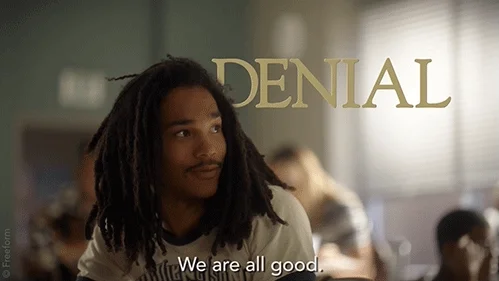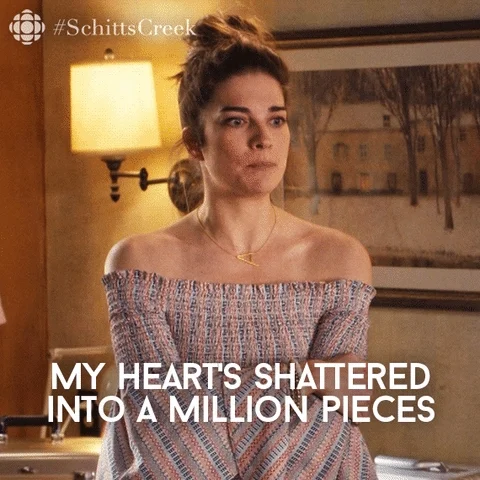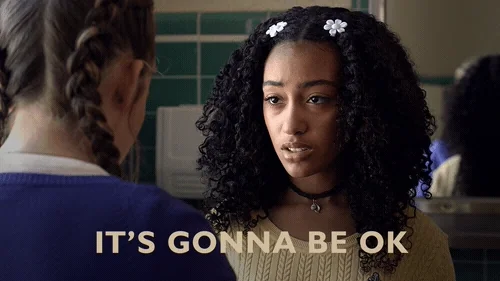Tom and Cara dated for 6 months and they seemed so happy.

But after prom, Cara broke up with Tom. Tom's emotions have been on a roller coaster since then. Cara was his first love.💔
Breakups are hard. Unfortunately, they're also a part of life.
How will Tom react after a breakup? Will he experience the 5 stages of grief?
What is Grief?

Grief is the anguish experienced after significant loss, usually the death of a beloved person.
— American Psychological Association
Grief can affect your:
Emotions — you may experience a range of emotions such as sadness, confusion, and anger.
Body — cortisol, the stress hormone, increases, and this can affect your eating and sleeping patterns.
Heart — your heart rate may increase due to stress.
Mind — intrusive thoughts can make it difficult to concentrate or focus.
Evaluating a Scientific Framework from the 1960s

Way back in 1969, Elisabeth Kubler-Ross, a Swiss-American psychiatrist, wrote a book in which she identified the 5 stages of grief. She based these stages on her interviews with people who were terminally ill.
It has been proposed that these stages also apply to people who experience a loss, including relationship breakups. But others feel that the stages of grief don't apply to breakups.
See what you think as you read about Tom's experience.
 Questions to Consider
Questions to Consider
Is a breakup similar to a death? If so, how?
Since not everyone experiences these stages, are they valid?
What if you're happy or relieved that the relationship ended?
Does the scientific explanation seem to apply to each stage?
Now let's get into those five stages and read about Tom's experience! You can also think about each of these stages from Cara's point of view. Could she be experiencing similar emotions?
Stage 1: Denial

The Stages of Grief: Breakups & Denial
Right after a breakup, you may feel blindsided: you can't believe what just happened! You might feel as if you're still in the relationship and if people ask you about it, you might say, "No, everything is fine."
 The Science Behind It
The Science Behind It
When we're in a relationship, we form an attachment bond with the other person. When that bond is broken, it's confusing and difficult to accept. While part of your mind knows it's true, other parts are still wired to believe the relationship continues to exist.
Denial is a defense mechanism that kicks in to help you protect yourself from anxiety and other strong emotions. This gives you more time to process a loss.

What Tom Might Be Experiencing
He's in shock and disbelief about the breakup.
He's confused — just yesterday, they seemed so happy!
He tells himself they'll get back together.
He keeps texting Cara as if nothing has changed.
Subscribe for more quick bites of learning delivered to your inbox.
Unsubscribe anytime. No spam. 🙂
Stage 2: Anger

The Stages of Grief: Breakups & Anger
During this stage, you may feel intense anger directed at your ex, yourself, or others. You might lash out at people even for small things.
 The Science Behind It
The Science Behind It
Humans are wired for attachment to others. A relationship loss can result in dysregulation of our attachment system, causing an "emotional spiral".
An underlying emotion of anger may be fear. Anger may act as a self-protective factor that helps us avoid and prepare for additional losses if we think our emotional safety is further at risk.

What Tom May Be Experiencing
He blames himself for the breakup.
He thinks about getting revenge (for example, he might decide to date someone else right away to get back at Cara for hurting him).
He yells at his parents when they ask him how his day was.
He tears up photos of them together.
Did you know?
Stage 3: Bargaining

The Stages of Grief: Breakups & Bargaining
During this stage, you might feel that if you could only be better, do better, or change in some way, you might be able to go back to the way things were.
 The Science Behind It
The Science Behind It
Bargaining is an attempt to control the situation as much as possible. Regret and guilt often accompany grief. It's common for people to ask themselves: "Would this have turned out differently if only I had...?"
 What Tom Might be Experiencing
What Tom Might be Experiencing
He starts working out so that he'll be more fit. He thinks this might improve his chances of getting back together with Cara.
He vows to himself or a higher power that he'll be a better boyfriend if they reconcile.
Quiz
What other types of losses might result in grief? Select all that apply.:
Stage 4: Sadness & Depression

The Stages of Grief: Breakups, Sadness & Anger
During this stage, you may feel intense sadness. This could include crying, isolation, and a lack of interest in activities you used to enjoy. This can also be the stage where you decide to spend time alone to process your feelings, preparing yourself to move on.

The Science Behind It
Neuroscientists have found that mental anguish causes the same amount of pain as actual physical injury. So the sadness you're experiencing really hurts.
 What Tom Might Be Experiencing
What Tom Might Be Experiencing
He's lost interest in sports even though he has always been a "super fan".
When his friends make plans, he decides to stay home instead.
He often listens to sad songs and relates to them all.
He's eating tons of junk food and sleeping a lot.
Did you know?
Stage 5: Acceptance

The Stages of Grief: Breakups & Acceptance
In this stage, you accept that the relationship is over. You may even be able to look back at it fondly or consider the person to be a friend.
You're emotionally ready to move on and explore new relationships.
 The Science Behind It
The Science Behind It
Over time, we are able to work through feelings of grief and move on, or heal. It doesn't mean that you've forgotten about the loss — rather, you accept that it was a hurtful experience and are now prepared to move forward, as the video below explains.
What Tom Might be Experiencing
He still regrets the breakup, but realizes it probably wasn't going to last forever.
He recalls the happy times without feeling so sad.
He's texting a new crush and they plan to go on a date soon.
Did you know?
Take Action

So what do you think?
Do the stages of grief apply to a breakup? Whether or not they do, breakups are often hurtful and difficult, so be sure to take care of yourself and seek professional help if you need it.
Chances are, you'll grow from the experience over time.
Grieving is a form of learning.
— Mary Frances O'Connor, author of The Grieving Brain
Learn more about grief and breakups with these resources:
Your feedback matters to us.
This Byte helped me better understand the topic.
